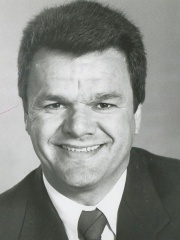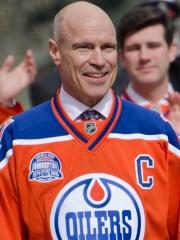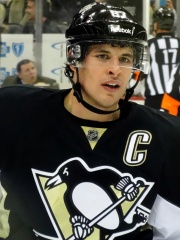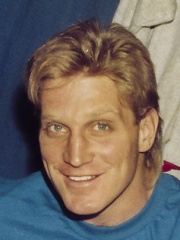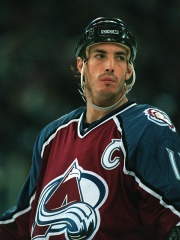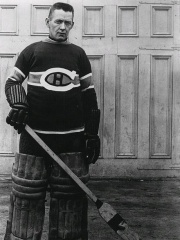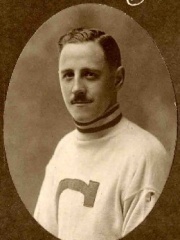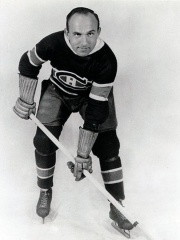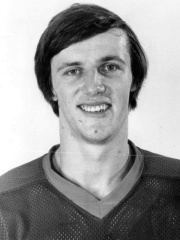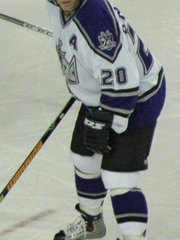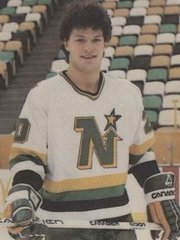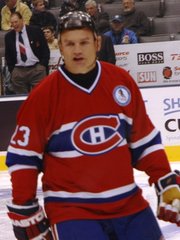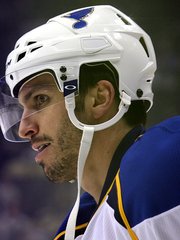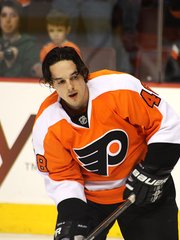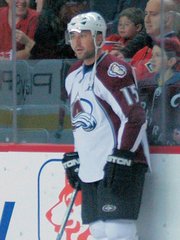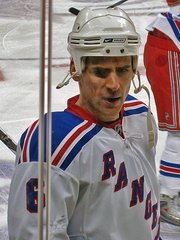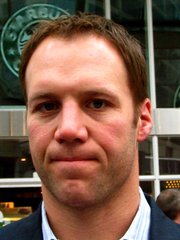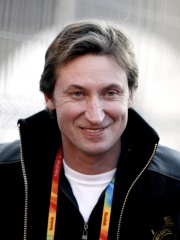
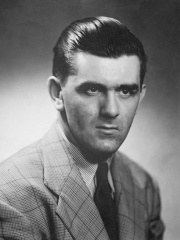
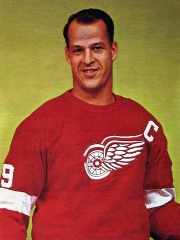
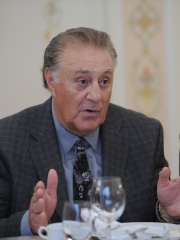
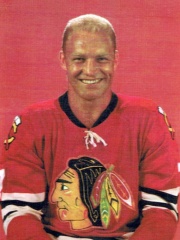
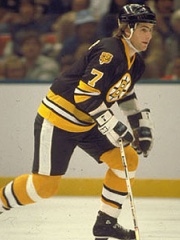
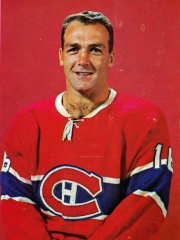
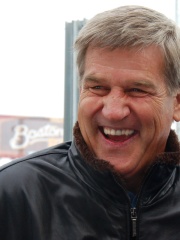
The Most Famous
HOCKEY PLAYERS from Canada
This page contains a list of the greatest Canadian Hockey Players. The pantheon dataset contains 676 Hockey Players, 188 of which were born in Canada. This makes Canada the birth place of the most number of Hockey Players.
Top 10
The following people are considered by Pantheon to be the top 10 most legendary Canadian Hockey Players of all time. This list of famous Canadian Hockey Players is sorted by HPI (Historical Popularity Index), a metric that aggregates information on a biography's online popularity. Visit the rankings page to view the entire list of Canadian Hockey Players.

1. Wayne Gretzky (b. 1961)
With an HPI of 68.72, Wayne Gretzky is the most famous Canadian Hockey Player. His biography has been translated into 60 different languages on wikipedia.
Wayne Douglas Gretzky ( GRET-skee; born January 26, 1961) is a Canadian former professional ice hockey player and former head coach. He played 20 seasons in the National Hockey League (NHL) for four teams from 1979 to 1999. Nicknamed "the Great One", he has been called the greatest ice hockey player ever by the NHL based on surveys of hockey writers, ex-players, general managers and coaches. Gretzky is the leading career point scorer and assist producer in NHL history and has more assists than any other player has total career points. He is the only NHL player to total over 200 points in one season, a feat he accomplished four times. In addition, Gretzky scored more than 100 points in 15 professional seasons. At the time of his retirement in 1999, he held 61 NHL records: 40 regular season records, 15 playoff records, and six All-Star records. Born and raised in Brantford, Ontario, Gretzky honed his skills on a backyard rink and regularly played minor ice hockey at a level far above his peers. Despite his unimpressive size and strength, Gretzky's intelligence, stamina, and reading of the game were unrivaled. He was adept at dodging checks from opposing players, consistently anticipated where the puck was going to be, and executed the right move at the right time. Gretzky became known for setting up behind his opponent's net, an area that was nicknamed "Gretzky's office". Gretzky was the top scorer in the 1978 World Junior Championships, then signed with the Indianapolis Racers of the World Hockey Association (WHA), where he briefly played before being traded to the Edmonton Oilers. After the NHL-WHA merger, he set many scoring records in ten seasons with the Oilers, and led them to four Stanley Cup championships. Traded to the Los Angeles Kings where he played eight seasons, he led them to the 1993 Stanley Cup Finals, and he is credited with popularizing hockey in California. He played briefly for the St. Louis Blues before finishing his career with the New York Rangers. He won nine Hart Trophies as the most valuable player, 10 Art Ross Trophies for most points in a season, two Conn Smythe Trophies as playoff MVP and five Lester B. Pearson Awards as the most outstanding player as judged by his peers. He led the league in goal-scoring five times and assists 16 times. He also won the Lady Byng Memorial Trophy for sportsmanship and performance five times and often spoke against fighting in hockey. After his retirement in 1999, Gretzky was immediately inducted into the Hockey Hall of Fame, making him the most recent player to have the waiting period waived. The NHL retired his jersey number 99 league-wide. Gretzky was one of six players voted to the International Ice Hockey Federation's (IIHF) Centennial All-Star Team. He was inducted into the IIHF Hall of Fame in 2000, and received the Order of Hockey in Canada in 2012. Gretzky became executive director for the Canadian national men's hockey team during the 2002 Winter Olympics, in which the team won a gold medal. In 2000, he became part-owner of the Phoenix Coyotes, and following the 2004–05 NHL lock-out, he became the team's head coach. In 2004, Gretzky was inducted into the Ontario Sports Hall of Fame. In September 2009, following the Phoenix Coyotes' bankruptcy, Gretzky resigned as head coach and relinquished his ownership share. In October 2016, he returned to the Oilers as a minority partner and vice-chairman of their parent company, Oilers Entertainment Group. He left in 2021 to become an analyst on Turner Sports' NHL coverage.

2. Maurice Richard (1921 - 2000)
With an HPI of 65.17, Maurice Richard is the 2nd most famous Canadian Hockey Player. His biography has been translated into 34 different languages.
Joseph Henri Maurice "Rocket" Richard ( rish-ARD, French: [mɔʁis ʁiʃaʁ]; August 4, 1921 – May 27, 2000) was a Canadian professional ice hockey player who played 18 seasons in the National Hockey League (NHL) for the Montreal Canadiens. He was the first player in NHL history to score 50 goals in one season, accomplishing the feat in 50 games in 1944–45, and the first to reach 500 career goals. Richard retired in 1960 as the National Hockey League's all-time leader in goals with 544. He won the Hart Trophy as the NHL's most valuable player in 1947, played in 13 All-Star Games and was named to 14 post-season NHL All-Star teams, eight on the first team. In 2017, Richard was named one of the 100 Greatest NHL Players in history. His younger brother Henri also played his entire career with the Canadiens, the two as teammates for Maurice's last five years. A centre nicknamed the "Pocket Rocket", Henri is enshrined alongside Maurice in the Hockey Hall of Fame. Richard, Elmer Lach and Toe Blake formed the "Punch line", a high-scoring forward line of the 1940s. Richard was a member of eight Stanley Cup championship teams, including a league record five straight between 1956 and 1960; he was the team's captain for the last four. The Hall of Fame waived its five-year waiting period for eligibility and inducted Richard in 1961. In 1975 he was inducted into Canada's Sports Hall of Fame. The Canadiens retired his number, 9, in 1960, and in 1999 donated the Maurice "Rocket" Richard Trophy to the NHL, awarded annually to the league's regular season leading goal-scorer. The oldest of eight children, Richard emerged from a poverty-stricken family during the Great Depression and was initially viewed as a fragile player. A string of injuries prevented him from joining the Canadian military during the Second World War. Intense, he was renowned for his physical and occasionally violent style of play. Richard was involved in a vicious on-ice incident late in the 1954–55 season during which he struck a linesman. NHL President Clarence Campbell suspended him for the remainder of the season and playoffs, which precipitated the Richard Riot in Montreal. The riot has taken on a mythical quality in the decades since and is often viewed as a precursor to Quebec's Quiet Revolution. Richard was a cultural icon among Quebec's francophone population; his legend is a primary motif in Roch Carrier's short story The Hockey Sweater, an emblematic work of Canadian culture. In 1998, Richard was diagnosed with abdominal cancer and died from the disease two years later. He was the first non-politician to be honoured by the province of Quebec with a state funeral.

3. Gordie Howe (1928 - 2016)
With an HPI of 65.07, Gordie Howe is the 3rd most famous Canadian Hockey Player. His biography has been translated into 40 different languages.
Gordon Howe (March 31, 1928 – June 10, 2016) was a Canadian professional ice hockey player. From 1946 to 1980, he played 26 seasons in the National Hockey League (NHL) and six seasons in the World Hockey Association (WHA); his first 25 seasons were spent with the Detroit Red Wings. Nicknamed "Mr. Hockey", Howe is often considered the most complete player ever to play the game and one of the greatest of all time. At his retirement, his 801 goals, 1,049 assists, and 1,850 total points were all NHL records that stood until they were broken by Wayne Gretzky, who himself has been a major champion of Howe's legacy. A 23-time NHL All-Star, he shares the NHL record for seasons played with Chris Chelios, and his all-time NHL games played record of 1,767 was only surpassed in 2021 by Patrick Marleau. In 2017, Howe was named one of the "100 Greatest NHL Players". Howe made his NHL debut with the Red Wings in 1946. He won the Art Ross Trophy for leading the league in points each year from 1950–51 to 1953–54, then again in 1956–57 and 1962–63, for a total of six times, which is the second most in NHL history. He led the NHL in goal-scoring four times. He ranked among the top ten in the NHL scoring for 21 consecutive years. He set an NHL record for points in a season (95) in 1953, a record that was broken six years later. He won the Stanley Cup with the Red Wings four times and won six Hart Trophies as the NHL's most valuable player. He also led the NHL in playoff points six times. Howe retired for the first time in 1971 and was immediately inducted into the Saskatchewan Sports Hall of Fame that same year. He was then inducted into the Hockey Hall of Fame the following year but came back two years later to join his sons Mark and Marty on the Houston Aeros of the WHA. Although in his mid-40s, he scored over 100 points twice in six years, won two straight Avco World Trophies (1974 and 1975), and was named most valuable player in 1974. He made a brief return to the NHL in 1979–80, playing one season with the Hartford Whalers, then retired at age 52. His involvement with the WHA was central to their brief pre-NHL merger success, forcing the NHL to recruit European talent and expand to new markets. Although Howe was most famous for his scoring prowess, he possessed great physical strength and toughness, and he redefined the ideal qualities of a forward by becoming known for his superior play on both offense and defense. He is the only player to have competed in the NHL in five different decades (1940s through 1980s); he also played a shift in a 1997 game for the Detroit Vipers of the IHL, playing professional hockey for a sixth decade. He became the namesake of the "Gordie Howe hat trick": a goal, an assist, and a fight in the same game, though he only recorded two such games in his career. He was the inaugural recipient of the NHL Lifetime Achievement Award in 2008.

4. Phil Esposito (b. 1942)
With an HPI of 60.32, Phil Esposito is the 4th most famous Canadian Hockey Player. His biography has been translated into 22 different languages.
Philip Anthony Esposito ( ESP-ə-ZEE-toh, Italian: [eˈspɔːzito]; born February 20, 1942) is a Canadian former professional ice hockey player, coach and executive, and current broadcaster for the Tampa Bay Lightning. A member of the Hockey Hall of Fame, he played 18 seasons in the National Hockey League for the Chicago Black Hawks, Boston Bruins, and New York Rangers, winning two Stanley Cups with Boston. He is considered one of the greatest players of all time, and is the older brother of the late fellow Hall-of-Famer goaltender Tony Esposito. He became the first player to score more than 100 points in a season, with 126 in 1968–69, a feat he would later achieve a further five times, also becoming the first player to score 50 goals in a season five times in a row, including the then record of 76 goals in 1970–71 to go with the then record 152 points the same year. Altogether, he won the Art Ross Trophy as the leading point scorer five times, led the league in goals six times, was voted the Hart Trophy for MVP twice, and was named as a first team All-Star centre six times. After retiring as a player, Esposito served as head coach and general manager for the Rangers for two seasons. In 1991, he and his younger brother co-founded the Tampa Bay Lightning, the first NHL team in Florida. The elder Esposito served as the franchise's first president and general manager until 1998; he now serves as Tampa Bay's radio colour commentator. Esposito was named one of the '100 Greatest NHL Players' in history in 2017, and the ninth-best player of all time by The Athletic in 2023. His #7 jersey was retired by the Bruins on December 3, 1987, and there is a statue in his likeness at Tampa Bay's Benchmark International Arena.
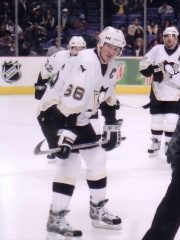
5. Mario Lemieux (b. 1965)
With an HPI of 60.02, Mario Lemieux is the 5th most famous Canadian Hockey Player. His biography has been translated into 46 different languages.
Mario Lemieux (; French: [ləmjø]; born October 5, 1965) is a Canadian former professional ice hockey player. He played parts of 17 seasons in the National Hockey League (NHL) for the Pittsburgh Penguins between 1984 and 2005, and he assumed ownership of the franchise in 1999. Nicknamed "the Magnificent One", "Le Magnifique", and "Super Mario", Lemieux is widely regarded as one of the greatest players of all time for his combination of size, strength, athleticism, and creativity. Drafted first overall by the Penguins in the 1984 NHL Entry Draft, Lemieux led Pittsburgh to consecutive Stanley Cup championships in 1991 and 1992. Under his ownership, the Penguins won additional titles in 2009, 2016, and 2017. He is the only man to have his name on the Cup both as a player and owner. He also led Team Canada to an Olympic gold medal in 2002, a championship at the 2004 World Cup of Hockey, and a Canada Cup in 1987. He won the Lester B. Pearson Award as the most outstanding player voted by the players four times, the Hart Trophy as the NHL's most valuable player (MVP) during the regular season three times, the Art Ross Trophy as the league's points leader six times, and the Conn Smythe Trophy as playoffs MVP in 1991 and 1992. He is the only player to score one goal in each of the five possible situations in a single NHL game, a feat he accomplished in 1988. At the time of his retirement, he was the NHL's seventh-highest career points scorer with 690 goals and 1,033 assists. He ranks second in NHL history with a 0.754 career goals-per-game average, behind Mike Bossy (0.762). He ranks second in NHL history with a 1.129 career assists-per-game average and a 1.883 points-per-game average, both behind Wayne Gretzky (1.320 and 1.921, respectively). Lemieux was never able to play a full season, and played in 70 or more games in a season on only six occasions during his career - four of which came before the age of 25. Lemieux's career was plagued by health problems that limited him to 915 of a possible 1,430 regular season games between the opening of the 1984–85 campaign and the conclusion of the 2005–2006 campaign. Lemieux's NHL debut was on October 11, 1984 and his final game took place on December 16, 2005. His numerous ailments included spinal disc herniation, Hodgkin's lymphoma, chronic tendinitis of a hip-flexor muscle, and chronic back pain so severe that other people had to tie his skates. He retired on two occasions due to these health issues, first in 1997 after battling lymphoma before returning in 2000, and then a second and final time in 2006 after being diagnosed with atrial fibrillation. Lemieux also missed the entire 1994–95 season due to Hodgkin's lymphoma. Despite his lengthy absences from the game, his play remained at a high level upon his return to the ice; he won the Hart Trophy and scoring title in 1995–96 after sitting out the entire previous season. He was on pace for 188 points, but only played in 70 games. He was also a finalist for the Hart Trophy when he made his comeback in 2000. In 1999, he bought the then-bankrupt Penguins and their top minor-league affiliate, the American Hockey League's (AHL) Wilkes-Barre/Scranton Penguins, and was the team's principal owner until selling controlling interest in the team to Fenway Sports Group in 2021. However, he remains part-owner and chairman of the board. The Hockey Hall of Fame inducted Lemieux immediately after his first retirement in 1997, waiving the normal three-year waiting period; upon his return in 2000, he became the third Hall of Famer (after Gordie Howe and Guy Lafleur) to play after being inducted. Lemieux's impact on the NHL has been significant: Andrew Conte of the Pittsburgh Tribune-Review called him the saviour of the Pittsburgh Penguins, and after Lemieux's retirement, Wayne Gretzky commented, "You don't replace players like Mario Lemieux ... The game will miss him." Bobby Orr called him "the most talented player I've ever seen." Orr, along with Bryan Trottier and numerous fans, speculated that if Lemieux had had fewer health issues, his on-ice achievements would have been much greater. In 2017, he was named one of the "100 Greatest NHL Players". He was inducted into Canada's Walk of Fame in 2004, and into the IIHF Hall of Fame in 2008.

6. Bobby Hull (1939 - 2023)
With an HPI of 59.50, Bobby Hull is the 6th most famous Canadian Hockey Player. His biography has been translated into 34 different languages.
Robert Marvin Hull (January 3, 1939 – January 30, 2023) was a Canadian professional ice hockey player who is widely regarded as one of the greatest players of all time. His blond hair, skating speed, end-to-end rushes, and ability to shoot the puck at very high velocity all earned him the nickname "the Golden Jet". His talents were such that an opposing player was often assigned just to shadow him. During his 23-year playing career, from 1957 to 1980, he played in both the National Hockey League (NHL) and World Hockey Association (WHA) with the Chicago Black Hawks, Winnipeg Jets, and Hartford Whalers. He won the Hart Memorial Trophy as the NHL's most valuable player twice and the Art Ross Trophy as the NHL's leading point scorer three times, while helping the Black Hawks win the Stanley Cup in 1961. He also led the WHA's Winnipeg Jets to Avco Cup championships in 1976 and 1978. He led the NHL in goals seven times, the second most of any player in history, and led the WHA in goals one additional time while being the WHA's most valuable player two times; his 77 goals scored in the 1974–75 WHA season was the most in league history. He was elected to the Hockey Hall of Fame in 1983, the Ontario Sports Hall of Fame in 1997, and received the Wayne Gretzky International Award in 2003. In 2017 Hull was named one of the '100 Greatest NHL Players' in history.

7. Ray Bourque (b. 1960)
With an HPI of 58.85, Ray Bourque is the 7th most famous Canadian Hockey Player. His biography has been translated into 22 different languages.
Raymond Jean Bourque (born December 28, 1960) is a Canadian former professional ice hockey player. He holds records for most career goals, assists, and points by a defenceman in the National Hockey League (NHL). He won the James Norris Memorial Trophy as the NHL's best defenceman five times, while finishing second for that trophy a further six times. He also twice finished second in the voting for the Hart Memorial Trophy, a rarity for a defenceman. He was named to the end-of-season All-Star teams 19 times, 13 on the first-team and six on the second-team. Bourque was also an Olympian with Canada and became nearly synonymous with the Boston Bruins franchise, for which he played 21 seasons and became Boston's longest-serving captain. Bourque finished his career with the Colorado Avalanche, with whom he won his only Stanley Cup championship in his final NHL game. In 2017, he was named one of the 100 Greatest NHL Players.

8. Henri Richard (1936 - 2020)
With an HPI of 58.69, Henri Richard is the 8th most famous Canadian Hockey Player. His biography has been translated into 19 different languages.
Joseph Henri Richard (February 29, 1936 – March 6, 2020) was a Canadian professional ice hockey player who played centre with the Montreal Canadiens in the National Hockey League (NHL) from 1955 to 1975. He was nicknamed "Pocket Rocket" after his older brother, Canadiens' legend and fellow Hockey Hall of Famer Maurice "Rocket" Richard. Henri played his entire professional career with the Canadiens and won the Stanley Cup 11 times as a player, the most in NHL history. Richard and Bill Russell of the National Basketball Association are tied for the record of the most championships won by an athlete in a North American sports league. In 2017, Richard was named one of the '100 Greatest NHL Players' in history.

9. Bobby Orr (b. 1948)
With an HPI of 57.86, Bobby Orr is the 9th most famous Canadian Hockey Player. His biography has been translated into 35 different languages.
Robert Gordon Orr (born March 20, 1948) is a Canadian former professional ice hockey player, widely acknowledged as one of the greatest players of all time. Orr used his skating speed, scoring, and play-making abilities to revolutionize the position of defenceman. He played in the National Hockey League (NHL) for 12 seasons, the first 10 with the Boston Bruins, followed by two with the Chicago Black Hawks. Orr remains the only defenceman to have won the league scoring title with two Art Ross Trophies. He holds the record for most points and assists in a single season by a defenceman. Orr won a record eight consecutive Norris Trophies as the NHL's best defenceman and three consecutive Hart Trophies as the league's most valuable player (MVP). Orr was inducted into the Hockey Hall of Fame in 1979 at age 31, the youngest to be inducted at that time. In 2017, Orr was named by the National Hockey League as one of the "100 Greatest NHL Players" in history. Orr started in organized hockey at age eight. He first played as a forward, but moved to defence and was encouraged to use his skating skills to control play. Orr's play in Ontario provincial competition attracted the notice of NHL scouts as early as age twelve. At fourteen, Orr joined the Oshawa Generals, the Bruins' junior hockey affiliate, and he was an all-star for three of his four seasons there. In 1966, Orr joined the Boston Bruins, a team that had not won a Stanley Cup since 1941 and had not made the playoffs since 1959. With Orr, the Bruins won the Stanley Cup twice, in 1970 and 1972. Both times, Orr scored the clinching goal and was named the playoff MVP. In the final achievement of his career, he was the MVP of the 1976 Canada Cup international hockey tournament. In 1976, Orr left Boston as a free agent to join the Black Hawks, but repeated injuries had effectively destroyed his left knee, and he retired in 1978 at age 30. Orr's first professional contract was one of the first in professional hockey to be negotiated by an agent. It made him the highest-paid player in NHL history as a rookie. His second contract was the first million-dollar contract in the NHL. However, after his retirement, Orr learned he was deeply in debt and he had to sell off most of what he owned. Orr broke with his agent Alan Eagleson and sued the Black Hawks to settle his contract. Orr and his family returned to Boston where Orr went into business to rebuild his finances. Orr aided the investigations that led to Eagleson's fraud convictions and disbarment. Orr also supported a lawsuit that challenged the NHL over its control of its pension plan. After his hockey career, he became a scout for several professional teams. Orr entered the player agent business in 1996 and was the president of the Orr Hockey Group agency, until its acquisition by the Wasserman Media Group in 2018. Orr is also active in charitable works and in television commercials. Since 1996, Orr has coached a team of junior hockey players in the annual CHL Top Prospects Game.
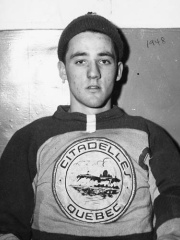
10. Jacques Plante (1929 - 1986)
With an HPI of 57.40, Jacques Plante is the 10th most famous Canadian Hockey Player. His biography has been translated into 21 different languages.
Joseph Jacques Omer Plante (French pronunciation: [ʒɑk plɑ̃t]; January 17, 1929 – February 27, 1986) was a Canadian professional ice hockey player. During a career as a goaltender lasting from 1947 to 1975, he was considered to be one of the most important innovators in hockey. He played for the Montreal Canadiens from 1953 to 1963; during his tenure, the team won the Stanley Cup six times, including five consecutive wins. In 2017 Plante was named one of the "100 Greatest NHL Players" in history. Plante retired in 1965 but was persuaded to return to the National Hockey League to play for the expansion St. Louis Blues in 1968. He was later traded to the Toronto Maple Leafs in 1970 and to the Boston Bruins in 1973. He joined the World Hockey Association as a coach and general manager for the Quebec Nordiques in 1973–74. He then played goal for the Edmonton Oilers in 1974–75, ending his professional career with that team. Plante was the first NHL goaltender to wear a goaltender mask in regulation play on a regular basis. He developed and tested many versions of the mask (including the forerunner of today's mask/helmet combination) with the assistance of other experts. Plante was the first NHL goaltender to regularly play the puck outside his crease in support of his team's defencemen, and he often instructed his teammates from behind the play. Plante was inducted into the Hockey Hall of Fame in 1978, was chosen as the goaltender of the Canadiens' "dream team" in 1985, and was inducted into the Quebec Sports Pantheon in 1994. The Montreal Canadiens retired Plante's jersey, #1, the following year. Plante ranks seventh among NHL goalies for all-time career wins with 437.
People
Pantheon has 188 people classified as Canadian hockey players born between 1885 and 2005. Of these 188, 159 (84.57%) of them are still alive today. The most famous living Canadian hockey players include Wayne Gretzky, Phil Esposito, and Mario Lemieux. The most famous deceased Canadian hockey players include Maurice Richard, Gordie Howe, and Bobby Hull. As of April 2024, 46 new Canadian hockey players have been added to Pantheon including Luc Robitaille, Ron Francis, and Brad Marchand.
Living Canadian Hockey Players
Go to all RankingsWayne Gretzky
1961 - Present
HPI: 68.72
Phil Esposito
1942 - Present
HPI: 60.32
Mario Lemieux
1965 - Present
HPI: 60.02
Ray Bourque
1960 - Present
HPI: 58.85
Bobby Orr
1948 - Present
HPI: 57.86
Marcel Dionne
1951 - Present
HPI: 54.86
Mark Messier
1961 - Present
HPI: 52.66
Bobby Clarke
1949 - Present
HPI: 51.98
Steve Yzerman
1965 - Present
HPI: 51.50
Sidney Crosby
1987 - Present
HPI: 51.47
Brett Hull
1964 - Present
HPI: 50.76
Joe Sakic
1969 - Present
HPI: 49.64
Deceased Canadian Hockey Players
Go to all RankingsMaurice Richard
1921 - 2000
HPI: 65.17
Gordie Howe
1928 - 2016
HPI: 65.07
Bobby Hull
1939 - 2023
HPI: 59.50
Henri Richard
1936 - 2020
HPI: 58.69
Jacques Plante
1929 - 1986
HPI: 57.40
Georges Vézina
1887 - 1926
HPI: 56.63
Guy Lafleur
1951 - 2022
HPI: 56.56
Ernie Collett
1895 - 1951
HPI: 56.03
Frank Sullivan
1898 - 1989
HPI: 54.62
Colin Carruthers
1890 - 1957
HPI: 53.50
Howie Morenz
1902 - 1937
HPI: 52.71
Mike Bossy
1957 - 2022
HPI: 52.45
Newly Added Canadian Hockey Players (2025)
Go to all RankingsLuc Robitaille
1966 - Present
HPI: 45.06
Ron Francis
1963 - Present
HPI: 42.92
Brad Marchand
1988 - Present
HPI: 40.42
Dino Ciccarelli
1960 - Present
HPI: 40.39
Brian Bellows
1964 - Present
HPI: 40.38
Larry Murphy
1961 - Present
HPI: 39.74
Greg Johnson
1971 - 2019
HPI: 37.56
Maxim Lapierre
1985 - Present
HPI: 36.55
Daniel Brière
1977 - Present
HPI: 36.43
Andrew Brunette
1973 - Present
HPI: 34.55
Wade Redden
1977 - Present
HPI: 34.35
Kirk Maltby
1972 - Present
HPI: 33.91
Overlapping Lives
Which Hockey Players were alive at the same time? This visualization shows the lifespans of the 25 most globally memorable Hockey Players since 1700.

